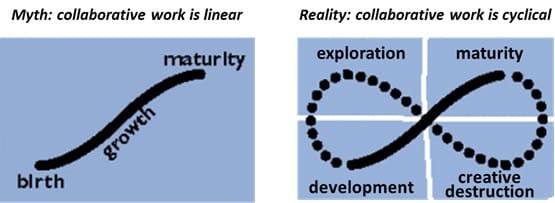FSG, the Strive Network, Tamarack, and the Aspen Forum for Community Solutions recently hosted a three-day workshop for leaders from backbone organizations of mature collective impact initiatives. This blog is part of a series sharing learning and reflection from the workshop.
Picture it: you’ve worked for two years to painstakingly build the relationships and trust necessary to establish agreement around a community-wide goal of eliminating poverty, to form a passionate and committed steering group, and to develop a set of shared metrics against which the community has agreed to measure its progress. Your partners are beginning to align themselves to these metrics and are developing strategies for addressing poverty using a variety of evidence-based interventions. By all accounts, this Collective Impact effort is moving full steam ahead…and then the bottom drops out.
Over just a few months, eight (EIGHT!) steering group members separately announce that they are leaving the initiative. While they each have valid reasons for their departure (e.g., one is leaving her government post to pursue other opportunities, another is moving out of the region), this is a huge blow to your confidence and you worry about its impact on others who look to this group as their role models. There are important partners you anticipate will back away from the project in light of these departures, and you have serious concerns about whether the project can recover its earlier momentum. The work has been hard before, but you have never felt as weary as you do right now.
This is exactly the type of setback that the Hamilton Roundtable on Poverty Reduction faced at a critical moment in its history. But the initiative survived and there’s a good reason for it: those involved embraced the opportunity for reflection; they were willing to let go of what was no longer essential to the work; and they rebuilt something stronger.
I attended the Champions for Change Backbone Workshop last week and was lucky enough to sit in on a session run by Liz Weaver of the Tamarack Institute. It was Liz who was involved in the Hamilton Roundtable and who recounted the story above. She also taught us about the Four Phases of Collaborative Change (adapted from Brenda Zimmerman and David Hurst’s work) – and this is where a light bulb went on for many of us in the room.
The premise is that collaborative efforts have eco-cycles (i.e. cycles of life, destruction, and renewal) and that the entire cycle – including the destruction and renewal part – is critical. Most collaboratives see their work as linear (birth, growth, maturity) and are terrified of moments of crisis like the one mentioned above. So, they rush to plug leaks and patch things up without reflecting on how the community has evolved or how they need to change – therefore, the cause of the crisis is not truly addressed and may arise again later. In contrast, the most resilient collaborative efforts respond to adversity by adapting and/or reinventing themselves (see FSG's article on Emergence in Collective Impact for more on adapting in the face of complex problems).
The four phases that make up this eco-cycle include:
-
Creative Destruction – characterized by confusion, loss, anger, blame, no/little structures or processes, reflection, relationships, values and principles, energy and urgency; the goal is vision
-
Exploration – characterized by creativity, messiness, uncertainty, first hand insights, outside ideas, multiple and unusual perspectives, (re)framing, independent and overlapping structures and processes, multiple options; the goal is new ideas
-
Development – characterized by entrepreneurialism, generalists, roles, adaptive structures and processes, prototyping and piloting, variation, flexible rules, emerging practice; the goal is effectiveness
-
Maturity – characterized by efficiency, certainty, stability, hierarchical structures and processes, clear tasks, rules, policies and procedures and standardization; the goal is productivity
I sensed some relief in the room as Liz walked us through this material. Encountering a crisis is not only normal but it can be good? Collective Impact efforts can not only survive these setbacks but become stronger as a result? Hallelujah.

